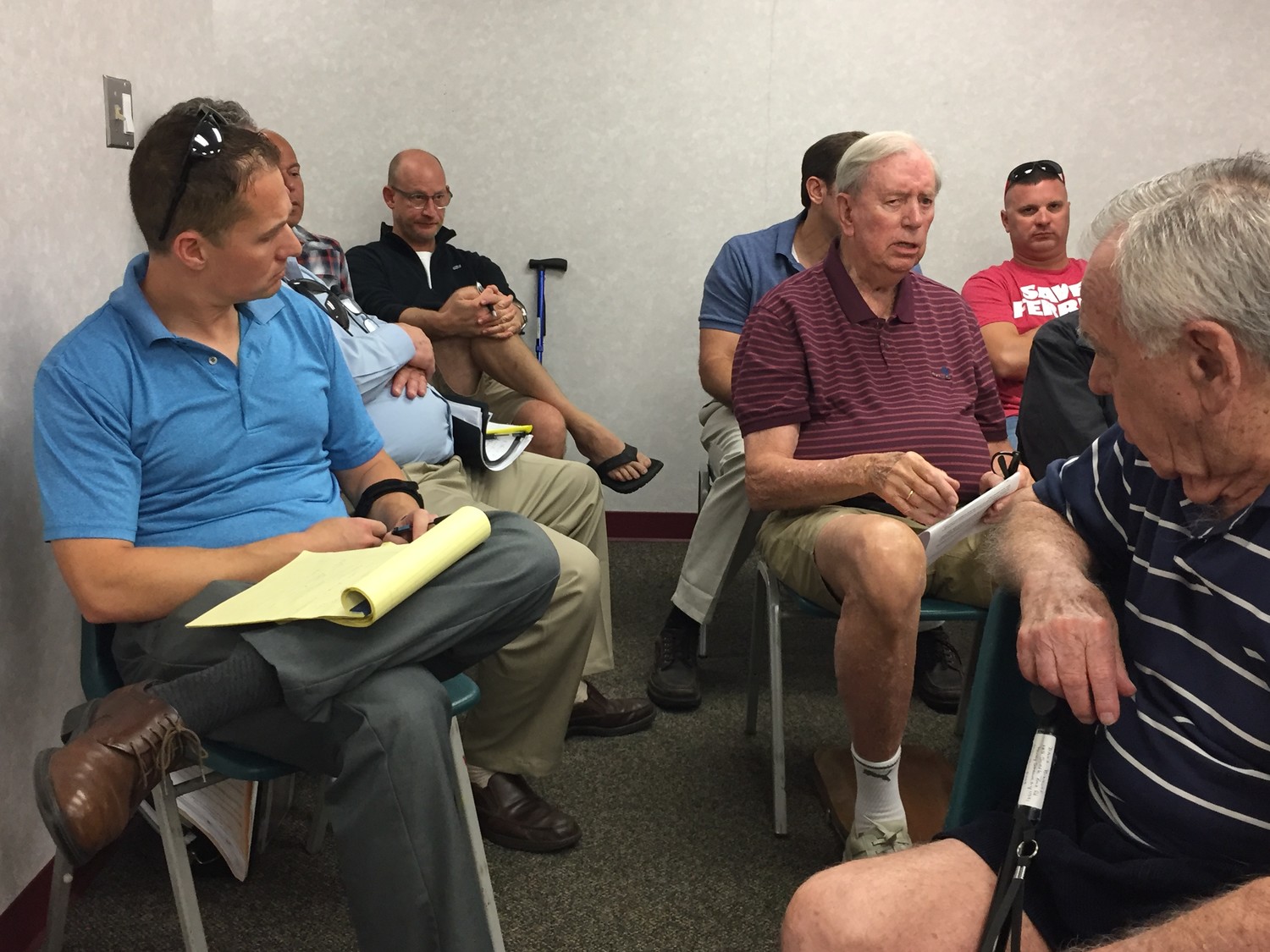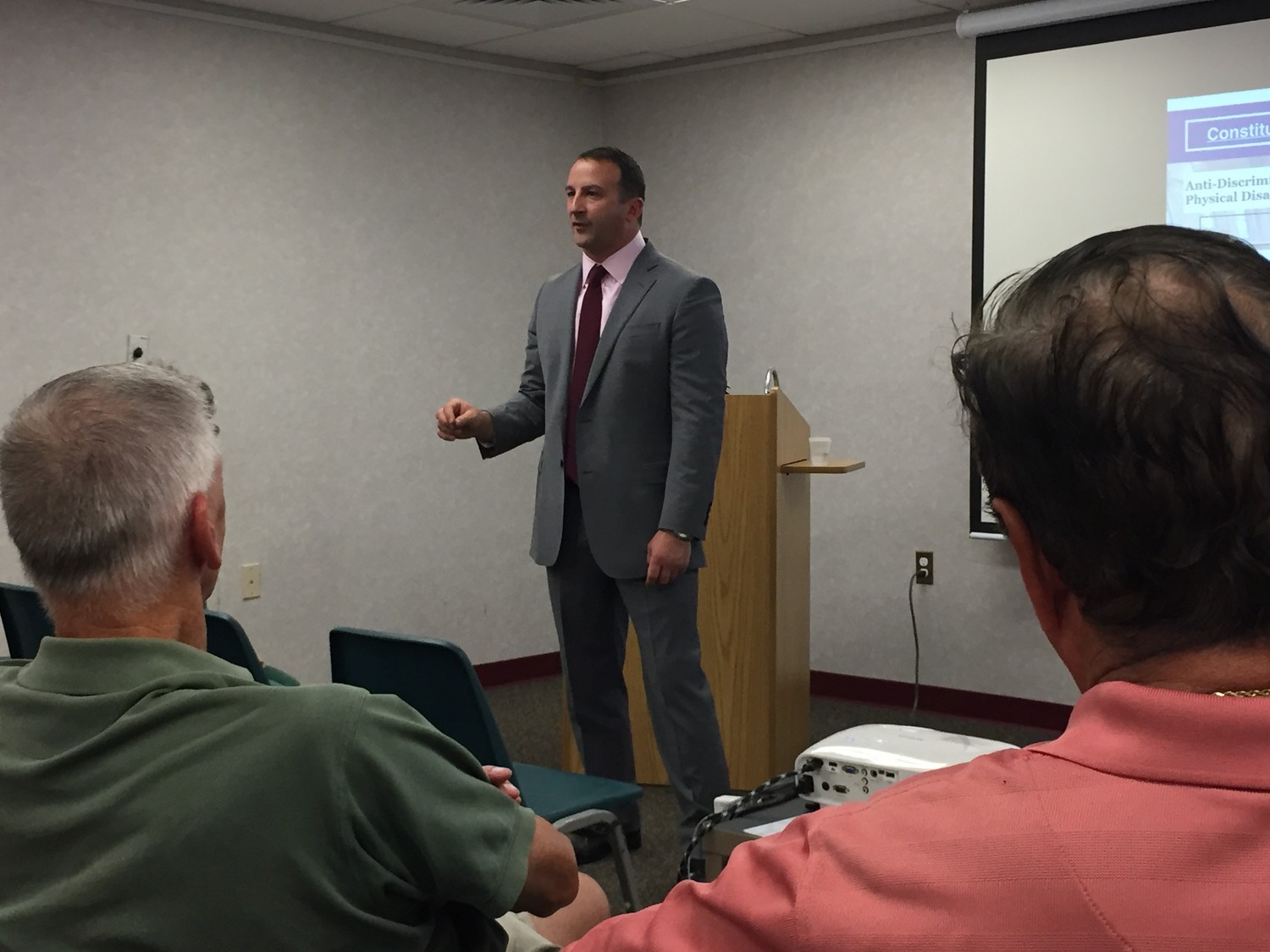To convene, or not to convene?
Residents discuss possibility of state constitutional convention

“Benjamin Franklin … was asked by a woman as he was coming out of the constitutional convention, ‘What sort of government have you produced?’” said Valley Stream resident Janet Halatyn at the Rockville Centre Public Library on Sept. 28. “And he said, ‘A republic, if you can keep it.’”
For the first time in 20 years, New Yorkers will have an opportunity on Nov. 7 to vote for or against a convening a state constitutional convention, during which delegates would meet in Albany to discuss amending parts of the state Constitution.
James Coll, of Seaford, a 20-year detective in the New York City Police Department who teaches American constitutional history at Nassau Community College and Hofstra University, led a discussion at the library about the possibility of a convention, which lands on the ballot every 20 years to give different generations a say on whether or not the document needs a closer look.
In 1997, the last time the option of a constitutional convention was on the ballot, 39.8 percent of eligible New Yorkers, about 4.2 million people, voted. The convention referendum failed to pass, and nearly 1.7 million of those who went to the polls didn’t bother to vote on it.
“I started to think about why they might not vote on this,” Coll said. “And I started to say, ‘Well, maybe they were really happy with government up in Albany.’” The crowd laughed. “This was as laughable in 1997 as it is in 2017,” he added.
He instead chalked up the constitutional indifference to an uninformed electorate. “Probably a lot of people didn’t know about this,” Coll explained. “They didn’t know that this was going to be a referendum on the ballot, or they didn’t know enough about it, so they left it to people to answer the question who knew about it.” He founded ChangeNYS, a not-for-profit organization that educates New Yorkers about the need for nonpartisan civic understanding and political reform in the state.
About 40 residents from around Long Island gathered in the library’s basement, for the hour-long talk. New York is one of 14 states that has a constitutional provision allowing its citizens to vote for a convention in varying years-long intervals. There have been nine constitutional conventions in New York’s history, the last one in 1967. The changes produced by the delegates were ultimately voted down, but four amendments were subsequently passed, in part, Coll said, because they had been brought up at the convention.
Civil rights groups are now concerned about the removal of equal protection rights, Coll said, while environmentalists worry that an article protecting forests could be changed. Others, he added, do not want the clause protecting pensions diminished by a convention. Those in favor of a convention, Coll said, may be looking to expand anti-discrimination statutes, and to add ethics reform provisions.
If a majority of voters oppose the convention, it would next appear on the ballot in 2037. If a majority of New Yorkers vote yes, a delegate-selection process would commence. Voters would select three delegates from each of the state’s 63 Senate districts in November 2018 from the candidates who garner a required number of signatures. Fifteen more delegates would be chosen at-large, bringing the total to 204.
The convention would start in April 2019, and delegates would meet periodically, Coll said, noting that they would each collect a $79,500 salary, and that there would be no time limit on how long they convene. The people would vote on any changes to the Constitution produced by the delegates.
But attendees of the meeting questioned the delegate-selection process, pointing out that elected office holders would have a better chance to receive backing than ordinary citizens. Some also expressed hesitation about a convention being worth what Coll said could cost hundreds of millions of dollars, noting that amendments to the Constitution could be made without a convention.
“It was just very informative, and I’m glad that somebody’s out here informing people on both sides of the issues,” Mineola resident Ken Cortes said after the meeting, adding, however, that he would be voting against a convention. “I think that nothing will get done in the end, and it could cost upwards of $300 million. “I think it would be a waste of taxpayer money.”
Rockville Centre resident Harold Peterson said after the meeting that he would also vote no to a convention, citing a lack of support from elected leaders, who don’t want anyone “to rain on their parade.” Coll added that many politicians do not want “a disruption of the status quo,” raising the issue of establishing term limits, for example.
“The idea of having something like this really should work,” Peterson said. “It gives people an opportunity to get involved obviously, and hopefully influence change, but I think as a practical consideration, I don’t think it will fly.”
Peterson said he had invited State Sen. Todd Kaminsky and Assemblyman Brian Curran to the discussion, neither of whom attended. Kaminsky told the Herald in a statement, “I am against a constitutional convention in New York state. While we desperately need ethics reform, a convention is not the only way to achieve it. Voters need to elect only those representatives committed to ethics reform, and I believe we are a few away from breaking a frustrating logjam in Albany.”
Whether voters mark yes or no on their ballots on Nov. 7, Coll, who said he understands the opinions of people on both sides of the issue, explained that it doesn’t stop there.
“We need to get more educated, we need to endorse candidates, we need to run, we need to write op-eds, we need to get more involved, as you’re doing here, spending a couple dozen minutes talking about an issue that’s important to you,” Coll told the crowd.
“Is this the best avenue?” he continued. “That’s going to be up for individual voters to decide. Are there other avenues? We know that there are. But what we need to do is be, as you are, a much more engaged citizenry.”






